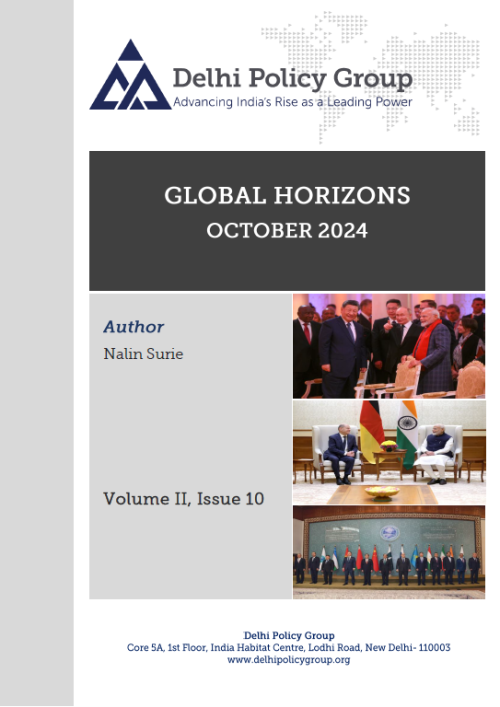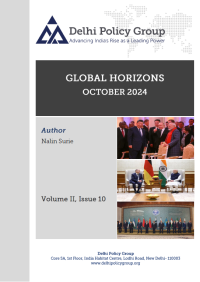Global Horizons
Date: November 09, 2024
In this issue, the author opens with reflections on the drama of the US Presidential election campaign which dominated the global public discourse during the month, to the detriment of ongoing crises in different parts of the world that await resolution. This only served to underline the overarching importance of the US in international relations.
Meanwhile, Israel pursued its objective of destroying Hamas and Hezbollah in an unrestrained manner, laying waste to southern Lebanon while also announcing a ban on UNRWA.
In Europe, Ukraine faced setbacks on the battlefield, even as President Zelenskyy’s “victory plan” found few serious takers, either in the US or Europe.
US President Biden made a farewell visit to Europe on October 18, meeting the leaders of Germany, France and the UK amidst growing anxiety in Europe regarding the future reliability of the US in the trans-Atlantic security alliance.
Russian President Putin hosted a successful 16th Summit of the BRICS nations in Kazan on October 23, which saw the adoption of a lengthy BRICS Declaration that, inter alia, highlighted the challenges deriving from unilateral sanctions imposed by the G7 countries in recent years. BRICS leaders, with the original founder members at their core, made it clear that decisions at this forum would only be taken on the basis of sovereign equality and consensus.
The BRICS Declaration recalled national positions on the Ukraine conflict, without offering any agreed formulation. Other issues, such as the use of local currencies in financial transactions, were merely “welcomed”. No new members were admitted beyond the five inducted last year, but 13 “partner countries” were announced, which included a disparate but important list of nations from South East Asia to Central Asia, Africa to Latin America.
The author observes that the gamble by Japan’s Prime Minister Ishiba in calling an early election backfired, as the LDP lost its majority. This does not bode well for Japan’s ability to meet growing security challenges in East Asia.
In the Indian Ocean, Britain finally bowed to the inevitable by agreeing to restore sovereignty over the Chagos Archipelago to Mauritius, even though the agreement permits the US-UK military base in Diego Garcia to be retained for 99 years, and possibly indefinitely. India welcomed the development.
October was a particularly consequential month for Indian foreign policy. Following several rounds of discussions between diplomatic and military counterparts, India and China arrived at an agreement on disengagement and patrolling along the LAC in the remaining two areas of eastern Ladakh affected by China’s violations of CBM agreements in 2020.
This paved the way for a meeting between PM Modi and President Xi in Kazan on the sidelines of the BRICS Summit on October 23, almost five years after their last meeting in 2019. Modi and Xi agreed that the Special Representatives on the boundary question will meet at an early date to oversee the management of peace and tranquillity in border areas and explore a mutually acceptable solution to the boundary question, while dialogue mechanisms at the level of Foreign Ministers and other officials would also be utilised to rebuild bilateral relations.
While this presages a modicum of normalcy in India-China ties, restoration of trust is not going to be easy.
President Muizzu of Mauritius paid an extended state visit to India from October 6-10, which saw the adoption of a Vision for Comprehensive Economic and Maritime Security Partnership and marked a fresh start in the bilateral relationship.
EAM Dr. S. Jaishankar visited Sri Lanka for high level interactions with the newly elected leadership of President Dissanayake, as well as Islamabad to attend the SCO Council of HOGs’ meeting. There was no bilateral engagement during the latter visit, but the Pakistani hosts kindled some hope by avoiding provocations during the SCO meeting.
To India’s east, PM Modi attended the India-ASEAN Summit and the East Asia Summit held in Vientiane on October 10-11, signalling the continuation of a deepening Act East policy and underlining the pivotal role of ASEAN in India’s Indo-Pacific vision and Quad cooperation.
The month also saw the visits of the German Chancellor and the Spanish Prime Minister to India, which raised the level of India’s cooperation with these important European nations in several areas, including technology, defence and mobility.
India’s diplomatic ties with Canada continued their downward spiral over Khalistani extremists being given a free rein by the Trudeau Government, and absurd allegations against India without presenting any evidence. India withdrew its High Commissioner from Canada and expelled Canadian diplomats.
The author concludes that the election of a new President in the US heralds significant departures in terms of US foreign policy from the incumbent administration, but India remains well placed to re-engage President Trump in his second term.
To read this Global Horizons, Vol. II, Issue 10, please see the PDF attached.
Meanwhile, Israel pursued its objective of destroying Hamas and Hezbollah in an unrestrained manner, laying waste to southern Lebanon while also announcing a ban on UNRWA.
In Europe, Ukraine faced setbacks on the battlefield, even as President Zelenskyy’s “victory plan” found few serious takers, either in the US or Europe.
US President Biden made a farewell visit to Europe on October 18, meeting the leaders of Germany, France and the UK amidst growing anxiety in Europe regarding the future reliability of the US in the trans-Atlantic security alliance.
Russian President Putin hosted a successful 16th Summit of the BRICS nations in Kazan on October 23, which saw the adoption of a lengthy BRICS Declaration that, inter alia, highlighted the challenges deriving from unilateral sanctions imposed by the G7 countries in recent years. BRICS leaders, with the original founder members at their core, made it clear that decisions at this forum would only be taken on the basis of sovereign equality and consensus.
The BRICS Declaration recalled national positions on the Ukraine conflict, without offering any agreed formulation. Other issues, such as the use of local currencies in financial transactions, were merely “welcomed”. No new members were admitted beyond the five inducted last year, but 13 “partner countries” were announced, which included a disparate but important list of nations from South East Asia to Central Asia, Africa to Latin America.
The author observes that the gamble by Japan’s Prime Minister Ishiba in calling an early election backfired, as the LDP lost its majority. This does not bode well for Japan’s ability to meet growing security challenges in East Asia.
In the Indian Ocean, Britain finally bowed to the inevitable by agreeing to restore sovereignty over the Chagos Archipelago to Mauritius, even though the agreement permits the US-UK military base in Diego Garcia to be retained for 99 years, and possibly indefinitely. India welcomed the development.
October was a particularly consequential month for Indian foreign policy. Following several rounds of discussions between diplomatic and military counterparts, India and China arrived at an agreement on disengagement and patrolling along the LAC in the remaining two areas of eastern Ladakh affected by China’s violations of CBM agreements in 2020.
This paved the way for a meeting between PM Modi and President Xi in Kazan on the sidelines of the BRICS Summit on October 23, almost five years after their last meeting in 2019. Modi and Xi agreed that the Special Representatives on the boundary question will meet at an early date to oversee the management of peace and tranquillity in border areas and explore a mutually acceptable solution to the boundary question, while dialogue mechanisms at the level of Foreign Ministers and other officials would also be utilised to rebuild bilateral relations.
While this presages a modicum of normalcy in India-China ties, restoration of trust is not going to be easy.
President Muizzu of Mauritius paid an extended state visit to India from October 6-10, which saw the adoption of a Vision for Comprehensive Economic and Maritime Security Partnership and marked a fresh start in the bilateral relationship.
EAM Dr. S. Jaishankar visited Sri Lanka for high level interactions with the newly elected leadership of President Dissanayake, as well as Islamabad to attend the SCO Council of HOGs’ meeting. There was no bilateral engagement during the latter visit, but the Pakistani hosts kindled some hope by avoiding provocations during the SCO meeting.
To India’s east, PM Modi attended the India-ASEAN Summit and the East Asia Summit held in Vientiane on October 10-11, signalling the continuation of a deepening Act East policy and underlining the pivotal role of ASEAN in India’s Indo-Pacific vision and Quad cooperation.
The month also saw the visits of the German Chancellor and the Spanish Prime Minister to India, which raised the level of India’s cooperation with these important European nations in several areas, including technology, defence and mobility.
India’s diplomatic ties with Canada continued their downward spiral over Khalistani extremists being given a free rein by the Trudeau Government, and absurd allegations against India without presenting any evidence. India withdrew its High Commissioner from Canada and expelled Canadian diplomats.
The author concludes that the election of a new President in the US heralds significant departures in terms of US foreign policy from the incumbent administration, but India remains well placed to re-engage President Trump in his second term.
To read this Global Horizons, Vol. II, Issue 10, please see the PDF attached.



